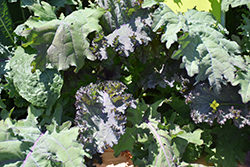Kale Storm Mixture
Brassica oleracea var. sabellica 'Storm Mixture'
Height: 24 inches
Spacing: 16 inches
Sunlight:
![]()
![]()
Hardiness Zone: (annual)
Description:
A beautiful selection that features a mix of different textured and colored edible leaves; colors range from green, purple and blue; great for containers or in ground for extended harvest; a mild well balanced flavor, great for many uses in the kitchen
Edible Qualities
Kale Storm Mixture is an annual vegetable plant that is commonly grown for its edible qualities. The crinkled oval green leaves with showy purple variegation and tinges of steel blue can be harvested at any time in the season. The leaves have a mild taste and a crunchy texture.
The leaves are most often used in the following ways:
- Fresh Eating
- Eating When Cooked/Prepared
- Cooking
Planting & Growing
Kale Storm Mixture will grow to be about 24 inches tall at maturity, with a spread of 24 inches. When planted in rows, individual plants should be spaced approximately 16 inches apart. This fast-growing vegetable plant is an annual, which means that it will grow for one season in your garden and then die after producing a crop.
This plant is typically grown in a designated vegetable garden. It does best in full sun to partial shade. It does best in average to evenly moist conditions, but will not tolerate standing water. It is not particular as to soil pH, but grows best in rich soils. It is somewhat tolerant of urban pollution. This is a selected variety of a species not originally from North America.
Kale Storm Mixture is a good choice for the vegetable garden, but it is also well-suited for use in outdoor pots and containers. With its upright habit of growth, it is best suited for use as a 'thriller' in the 'spiller-thriller-filler' container combination; plant it near the center of the pot, surrounded by smaller plants and those that spill over the edges. It is even sizeable enough that it can be grown alone in a suitable container. Note that when growing plants in outdoor containers and baskets, they may require more frequent waterings than they would in the yard or garden.

